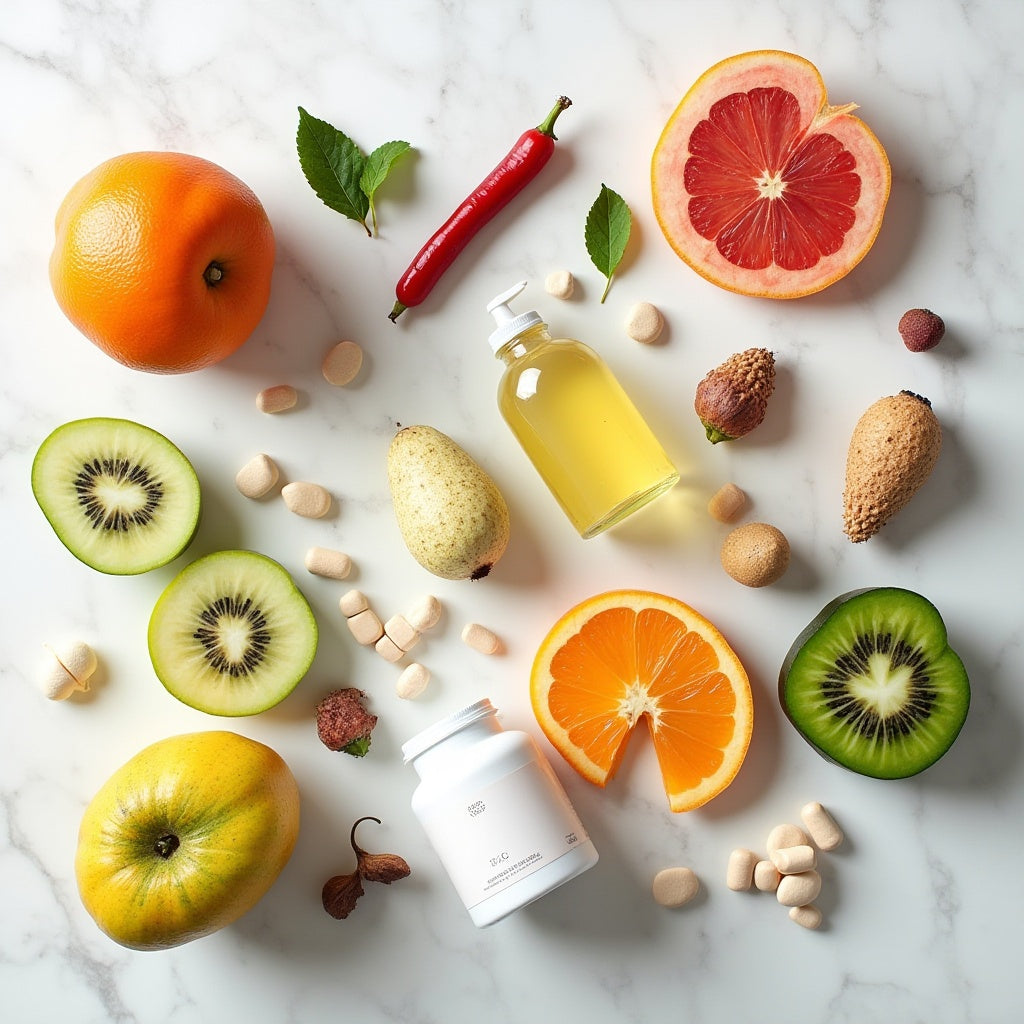
10 Essential Vitamins Everyone Needs for Optimal Health
Share
In today's fast-paced world, getting all the nutrients we need from diet alone can be challenging. While whole foods should always be your primary source of nutrition, understanding which vitamins are essential can help you make informed decisions about supplementation and dietary choices.
Vitamin D: The Sunshine Vitamin
Vitamin D is crucial for bone health, immune function, and mood regulation. Many people are deficient, especially those living in northern climates or spending most time indoors. This vitamin helps your body absorb calcium and supports immune system function.
Food sources: Fatty fish, egg yolks, fortified dairy Daily needs: 600-800 IU (15-20 mcg) Supplement consideration: Especially important for those with limited sun exposure
Vitamin B12: Energy and Brain Health
B12 is essential for energy production, brain function, and red blood cell formation. Deficiency can lead to fatigue, weakness, and neurological issues. This is particularly important for vegetarians and vegans as B12 is primarily found in animal products.
Food sources: Meat, fish, dairy, eggs, fortified foods Daily needs: 2.4 mcg Supplement consideration: Essential for those following plant-based diets
Vitamin C: Immune Support Powerhouse
This powerful antioxidant supports immune function, collagen production, and wound healing. Unlike many animals, humans cannot produce vitamin C and must obtain it through diet.
Food sources: Citrus fruits, berries, bell peppers, broccoli Daily needs: 75-90 mg Supplement consideration: During illness or high stress periods
Vitamin A: Vision and Skin Health
Vitamin A is crucial for vision, immune function, skin health, and cell growth. It exists in two forms: preformed vitamin A (retinol) from animal sources and provitamin A (beta-carotene) from plants.
Food sources: Sweet potatoes, carrots, leafy greens, liver Daily needs: 700-900 mcg Supplement consideration: Most people get enough from diet
Vitamin E: Antioxidant Protection
Vitamin E protects cells from oxidative stress and supports immune function. It's a fat-soluble antioxidant that works throughout the body to protect cell membranes.
Food sources: Nuts, seeds, vegetable oils, leafy greens Daily needs: 15 mg Supplement consideration: Usually adequate through diet
Vitamin K: Bone and Blood Health
Essential for blood clotting and bone metabolism, vitamin K is often overlooked but critically important. There are two main forms: K1 from plants and K2 from fermented foods and animal products.
Food sources: Leafy greens, broccoli, fermented foods Daily needs: 90-120 mcg Supplement consideration: Those on certain medications or with digestive issues
B-Complex Vitamins: Energy Metabolism
The B-vitamin family (B1, B2, B3, B5, B6, B7, B9) works together to convert food into energy, support brain function, and maintain healthy skin, hair, and eyes. Each B vitamin has unique roles but they work synergistically.
Food sources: Whole grains, meat, eggs, legumes, leafy greens Daily needs: Varies by specific B vitamin Supplement consideration: B-complex supplements ensure balanced intake
Folate (B9): Cell Growth and Development
Especially crucial during pregnancy for fetal development, folate supports cell division and DNA synthesis. Adequate folate intake is essential for everyone but particularly important for women of childbearing age.
Food sources: Leafy greens, legumes, citrus, fortified grains Daily needs: 400 mcg (600 mcg during pregnancy) Supplement consideration: Critical before and during pregnancy
Magnesium: The Relaxation Mineral
While technically a mineral, magnesium deserves mention as many people are deficient. It supports muscle and nerve function, energy production, and bone health. Magnesium also helps regulate blood pressure and blood sugar.
Food sources: Nuts, seeds, whole grains, leafy greens, dark chocolate Daily needs: 310-420 mg Supplement consideration: Common deficiency, especially with high stress
Omega-3 Fatty Acids: Brain and Heart Health
These essential fatty acids support heart health, brain function, and reduce inflammation throughout the body. The body cannot produce omega-3s, making dietary intake essential.
Food sources: Fatty fish, walnuts, flaxseeds, chia seeds Daily needs: 250-500 mg combined EPA and DHA Supplement consideration: Beneficial for those who don't eat fish regularly
Understanding Your Needs
Individual vitamin needs vary based on age, sex, health status, diet, and lifestyle. Factors affecting your requirements include:
- Age: Needs change throughout life stages
- Diet: Restrictive diets may require supplementation
- Health conditions: Certain conditions increase nutrient needs
- Medications: Some drugs interfere with nutrient absorption
- Lifestyle: Stress, exercise, and habits affect requirements
Food First Approach
While supplements can fill gaps, whole foods should be your primary nutrient source. Whole foods provide:
- Fiber and beneficial compounds supplements lack
- Better nutrient absorption
- Synergistic effects of combined nutrients
- Lower risk of excessive intake
When to Consider Supplements
Supplementation may be beneficial when:
- Following restrictive diets (vegan, vegetarian)
- Diagnosed with deficiency
- Pregnant or planning pregnancy
- Over 50 (B12, D absorption decreases)
- Limited sun exposure (vitamin D)
- High stress or illness
Choosing Quality Supplements
If you supplement, quality matters:
- Look for third-party testing (USP, NSF, ConsumerLab)
- Check for bioavailable forms
- Avoid mega-doses unless prescribed
- Consider timing and interactions
- Store properly to maintain potency
Final Thoughts
A balanced diet rich in whole foods should provide most essential vitamins. However, strategic supplementation can help fill gaps and support optimal health. Always consult with a healthcare provider before starting new supplements, especially if you have health conditions or take medications.
Ready to support your nutritional health? Explore our curated collection of high-quality supplements at Eternawell and take the first step toward optimal wellness.